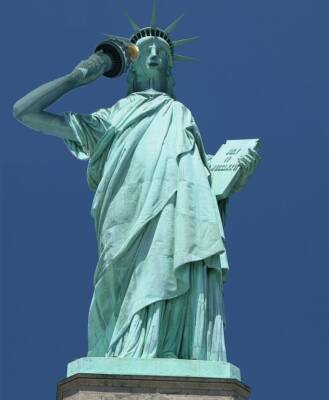Lady Liberty still beckons as she sings the blues.
“Behold! I do not give lectures…” (Walt Whitman)
A marketable Parisian-style literary critic who taught in SUNY-Buffalo’s English Department for a few years during America’s “love-in” period left us a note before she decamped for the California vineyards of academe: “You have the most imaginative English Department in the least chic building imaginable, my heart goes out to you, Sans adieu!”

Prof. Left Bank had a point, but we were more fanciful than she had observed because she taught only a seminar once a week on “Nil: The Expanse of Emptiness.”
Not having spent much time in our deceptively modest halls, she didn’t know how many pedagogic pageants were being staged by colleagues in our Quonset Hut classrooms.
Our English department in those years of spirited anti-war protest was something like a world-class aviary in which each office was a perch on which alighted a rara avis of academic criticism, scholarship, and creative writing.
The department was more than a little like the Roger Tory Petersen Museum in Jamestown, N.Y., not too far south of Buffalo: a Northern Flicker (“spark bird”) on one office twig; a Bald Eagle on another, and so on down the rectangular aviary.
It sometimes seemed as I flapped my wings on the way to the mailroom that I heard bird-calls, not conversations, as I passed open doors during office hours.
One of these bird-songs emanated from the office of someone I came to admire as a “feathered friend,” a poet and Walt Whitman-scholar, who had written a dissertation on Democratic Vistas and Liberation in Walt Whitman’s Epic.
Interested during those years of the open classroom, person-centered teaching, and the psychology of learning, I was intrigued by the word “liberation” in his title which included over time the occasional “libation” in his office.
We tried out some educational experiments together and separately. We were known as the “Einstein and Beer-Stein” of the English Department.
He invited me eventually to observe two of his experiments designed to help students soar on pinioned wings above the distinctions and snobberies that separated people so that they could become one Whitmanesque soul, if only as a possibility.
In one experiment, “Whit,” as I called him, moved from the desk towards the back of the classroom row by row every ten minutes until he reached the back of the room — thus to surrender his role as an authority-figure.
A luftmensch of some girth, he moved gracefully as he virtually sang lines from Song of the Open Road, “Afoot and light-hearted I take to the open road.”
I could see in the attentive eyes of some students that they were getting their backpacks ready to hit the road for California. A few would ask him later, having dropped out for a term, if they could get credit for “going West.”
In another memorable exercise, Whit degentrified himself from class to class in this sequence: Columbia University Ph.D. gown; Brooks Bros. suit; Macy’s leisure suit; J.C. Penny polyester sport jacket…unto a hardware store-bought pair of overalls.
If not the seven ages of man, it was nonetheless an inventive Lincolnesque transformation of the “master”-teacher into the common-undergraduate. He also altered his accent from meeting to meeting: Ivy-League clipped speech to drawn out South Carolina inflections.
When the Vietnam War ended, mercifully, I got a surprising note from my former colleague in which she expressed some nostalgic longing for the “new and fresh literary wines’ of the Niagara Escarpment, Vive Le Beau Fleuve/Buffalo!”
Had absinthe made her heart grow fonder for those seemingly ancient and somewhat zany days of imagined communalism in our Army Surplus building?
The Niagara River was stronger than the Loire, but the academic vineyards of Western New York never could be imbued with as much spirit of revolt against repressive authority as Paris in Mai 1968.
But there was a moment in Buffalo and America when a new generation believed that life-enhancing imagination was more inspiring than dehumanizing propaganda and open vistas more appealing than hidden corridors of conspiratorial suppression.
There was a time when the unifying words of Lincoln and Whitman were more inspiring than the demonization of mythic aliens who, if not from outer space, nonetheless threaten us.
But they are witless. The false-prophets are the aliens: estranged from the foundational principles of our Democracy and its affirmation of the “We” in “We the People.”
But Lady Liberty, disappointed, still beckons us to cross Brooklyn Ferry to a “more perfect union”!
Howard R. Wolf is the author of the forthcoming short novel, Distant Love, and an earlier memoir, Forgive The Father: A Memoir of Changing Generations. Some of the essays in his The Education Of A Teacher: Essays on American Culture may serve as a partial record of a failed “brave New World” during the period 1965-1985).
- Red States in the Sunset - August 10, 2023
- A Robin Hood Rerun - July 26, 2023
- Space Exploration: In Dreams Begin Responsibilities - July 3, 2023

